-
2026
Previous Year Paper
-
2025
Previous Year Paper
-
2024
Previous Year Paper
-
2023
Previous Year Paper
-
2022
Previous Year Paper
-
2021
Previous Year Paper
-
2020
Previous Year Paper
-
2019
Previous Year Paper
-
2018
Previous Year Paper
-
2017
Previous Year Paper
-
2016
Previous Year Paper
-
2015
Previous Year Paper
-
2014
Previous Year Paper
-
2013
Previous Year Paper
-
2012
Previous Year Paper
-
2011
Previous Year Paper
-
2010
Previous Year Paper
-
2009
Previous Year Paper
-
2008
Previous Year Paper
If you are planning to take this examination, then thorough preparation is very necessary. You will be able to do this by solving the CLAT previous year question paper which is available free of cost on the educational website of SelfStudys.
The CLAT previous year paper will not only help you to get familiar with the environment of the exam but also assist you in noticing your strengths and weaknesses. When you revisit the past questions, you can observe any trends, focus on the topics that are asked frequently, and enhance your overall strategy for the exam.
Format Of The Common Law Admission Test
In the table below, we have described the format of the questions that are covered in the Common Law Admission Test. You should have a look at it to understand the format properly.
| ASPECT | DETAILS |
|---|---|
|
Mode of the Examination |
Offline - Pen and Paper based test |
|
Examination Medium |
English |
|
Total Duration of the Examination |
2 hours (120 minutes) |
|
Total Number of Questions |
120 questions |
|
Types of Questions |
Multiple-choice questions |
|
Marking Scheme |
|
|
Subjects Areas |
|
|
Approximate Number of Questions in Every Subject |
|
CLAT Previous Year Paper For Various Years
The expert team of SelfStudys has collected the CLAT PYQs for a number of years. You can explore these papers to understand the changes in trends and focus your study efforts on the major areas. The practice of the various past papers will also enhance your problem-solving as well as analytical skills effectively for the upcoming examination. We have placed the links for the papers below so that you can access them without any hassle.
Solutions Provided For The CLAT PYQs
After getting the previous year CLAT question paper from the official sources, our team spends countless hours analyzing each question and preparing their correct solutions. They further include detailed explanations of the solutions. By doing so, we make sure that you can understand the underlying principles of the solutions and notice the areas where you are making mistakes. With this knowledge, you can make changes in your study plan and have focused practice sessions.
Eligibility Criteria For The Common Law Admission Test
Some important factors regarding exam eligibility that you should be aware of are mentioned in the points below.
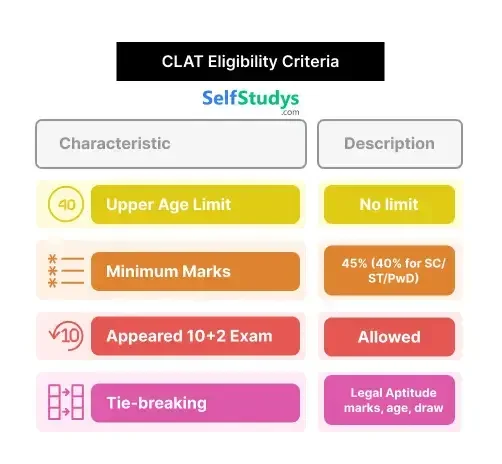
- For appearing in the Common Law Admission Test, there is no limit of upper age.
- You should have passed 10+2 or an equivalent examination with a minimum of 45% of marks. If you belong to the SC/ ST/ PwD categories, then you should have 40% marks in this exam.
- You can apply for the CLAT even if you are appearing in the 10+2 exam during the same year. You just have to provide evidence of you passing class 12th at the time of admission.
- If an equal number of marks are scored by you as well as some other candidates in the Common Law Admission Test, then the break of the tie will be as follows:
- Higher marks in the component/section on Legal Aptitude in the CLAT 2025 exam;
- Higher age;
- Computerized draw of lots
Process To Solve The Previous Year CLAT Question Paper At SelfStudys
For your benefit, we have provided the step-by-step process for accessing the CLAT exam previous year question paper and solving it on our platform for free.
- You can open any browser and type www.selfstudys.com to reach the website.

- There, your first click needs to be on the ‘Navigation’ bar from the elements on the homepage.
- This bar will showcase a variety of categories from where you should select the ‘CLAT’ icon.
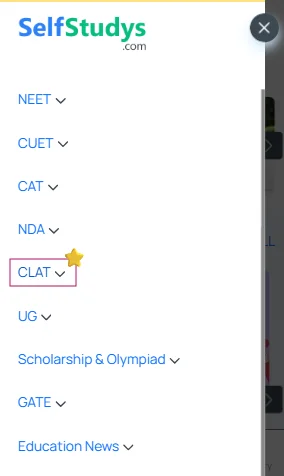
- Now, all the study materials regarding this exam will be visible and you can tap on the ‘CLAT PYQs’ option.
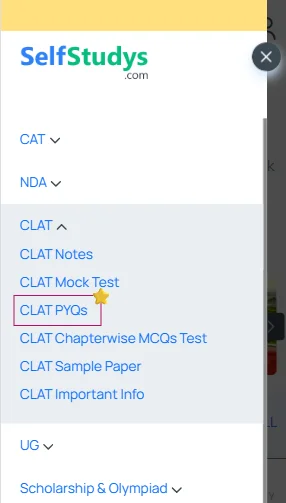
- Soon, your screen will open up a new web page that has the CLAT previous year question paper PDF for several years.
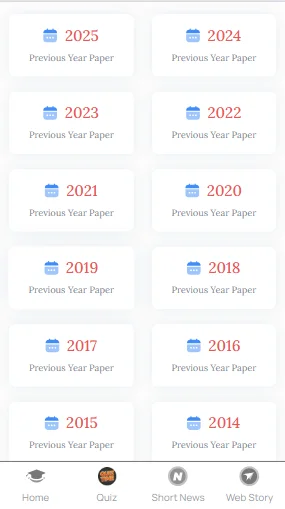
- You can choose any year to get its CLAT previous year question papers with answers PDF download.
- Finally, you have the option to solve the CLAT previous year question paper online or download the file for free.
Note: Make sure to Log In or Sign Up with your Gmail ID to download the CLAT previous year paper from SelfStudys.
Syllabus For The Common Law Admission Test
The table given below represents all the topics across different subjects that are a part of the Common Law Admission Test syllabus.
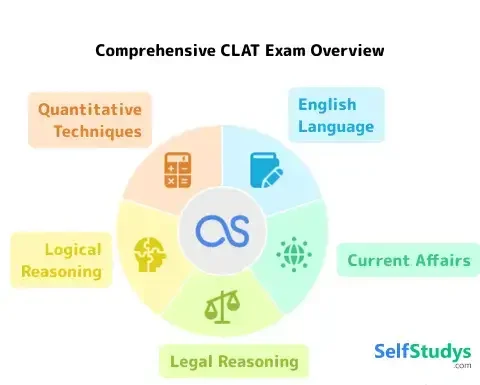
| SUBJECT | TOPICS COVERED | DETAILS |
|---|---|---|
|
English Language |
Reading Comprehension |
Passages based on contemporary or historical topics with questions testing comprehension, inference, vocabulary, and tone. |
|
Vocabulary |
Synonyms, antonyms, word usage, idioms, and phrases. |
|
|
Grammar |
Sentence correction, error spotting, fill in the blanks. |
|
|
Inference-based Questions |
Drawing conclusions from the given text. |
|
|
Contextual Meaning |
Understanding the meaning of words in context. |
|
|
Current Affairs including General Knowledge |
National and International Events |
Important news and updates from the past 6 to 12 months. |
|
Awards and Honours |
National/international recognitions, Nobel prizes, etc. |
|
|
Sports |
Major tournaments, winners, records. |
|
|
Government Schemes and Policies |
Central/ state schemes, economic programs. |
|
|
Science and Technology |
Recent developments, ISRO, and DRDO updates. |
|
|
Historical Events |
Important historical milestones linked to current events. |
|
|
Static GK |
Important books and authors, geography, political facts |
|
|
Legal Reasoning |
Legal Principles and Facts |
Questions based on legal maxims, principles, and case-based scenarios. |
|
Legal GK |
Supreme Court judgments, constitutional amendments. |
|
|
Torts, Contracts, Criminal Law |
Basic understanding tested through hypothetical situations. |
|
|
Legal Aptitude |
Application of laws to new situations. |
|
|
Legal Current Affairs |
Recent legal developments, major cases. |
|
|
Logical Reasoning |
Critical Reasoning |
Strengthening/weakening arguments, assumption, conclusion. |
|
Analytical Reasoning |
Puzzles, seating arrangement, blood relations. |
|
|
Arguments and Conclusions |
Identify valid arguments, drawing logical conclusions. |
|
|
Syllogisms |
Statement and conclusion-based questions. |
|
|
Statement and Assumption |
Inference and logical connectives. |
|
|
Quantitative Techniques |
Data Interpretation |
Pie charts, bar graphs, line charts, tables. |
|
Arithmetic |
Percentages, ratio, and proportion, averages, profi,t, and loss. |
|
|
Number Systems |
Basic number properties, factors, multiples. |
|
|
Algebra |
Simple linear equations |
|
|
Mensuration |
Area, perimeter, and volume of geometrical figures. |
|
|
Time, Speed, Distance, and Time and Work |
Problem-solving using basic formulas |
Why Practice The CLAT Exam Previous Year Question Paper?
Solving the previous year CLAT question paper is important to add value to your exam preparation. Some points on why you should practice this resource are mentioned in detail below.
- With the practice of the CLAT exam previous year question paper, you will get a clear picture of the pattern of the actual exam. It will include section-wise question distribution, question formats, weightage of topics, and so on. With the PYPs, you will see what appeared in the exams actually which will enhance your preparation strategy for sure.
- By analyzing the CLAT previous year question paper PDF, you can easily spot the themes and topics that reoccur. For example, certain types of law cases might appear again and again in the Legal Reasoning section. So, with the focus on them, you will be able to enhance your preparation.
- In the Common Law Admission Test, knowledge as well as speed, and accuracy have equal importance. Engaging with the CLAT previous year question papers with answers PDF download under timed conditions, you can train your brain to allot time across every section in an efficient manner. For this, you can also attempt the CLAT sample paper on our platform.
- When you attempt multiple CLAT previous year question papers, you can track your progress by using the metrics for the real exam. These can be score trends, accuracy rates, time per question, etc. Then, with this data, you will be able to refine your strategies on the basis of the evidence and not just guesswork.
- By solving the CLAT previous year paper on a regular basis, you will build a good sense of the logic behind the question. It can be useful, especially in the Logical and Legal Reasoning sections. As you start to sense what the examiner is looking for, you can solve the questions much more confidently.
Universities That Participate In The Common Law Admission Test And Offered Programs
Over 26 universities have participated in the past Common Law Admission Test. For your reference, we have mentioned the names of these universities with the programs that they offer to the qualified candidates.
| NAME OF THE UNIVERSITY |
OFFERED PROGRAMS |
|---|---|
|
National Law School of India University, Bengaluru |
|
|
NALSAR University of Law, Hyderabad |
|
|
National Law Institute University, Bhopal |
|
|
The West Bengal National University of Juridical Sciences, Kolkata |
|
|
National Law University, Jodhpur |
|
|
Hidayatullah National Law University, Raipur |
|
|
Gujarat National Law University, Gandhinagar |
|
|
Gujarat National Law University, Silvassa Campus |
|
|
Dr. Ram Manohar Lohiya National Law University, Lucknow |
|
|
Rajiv Gandhi National University of Law, Punjab |
|
|
Chanakya National Law University, Patna |
|
|
The National University of Advanced Legal Studies, Kochi |
|
|
National Law University, Odisha |
|
|
National University of Study and Research in Law, Ranchi, Jharkhand |
|
|
National Law University and Judicial Academy, Assam |
|
|
Damodaram Sanjivayya National Law University, Visakhapatnam |
|
|
Tamil Nadu National Law University, Tiruchirappalli |
|
|
Maharashtra National Law University, Mumbai |
|
|
Maharashtra National Law University, Nagpur |
|
|
Maharashtra National Law University, Chhatrapati Sambhajinagar (Aurangabad) |
|
|
Himachal Pradesh National Law University, Shimla |
|
|
Dharmashastra National Law University, Jabalpur |
|
|
Dr. B.R. Ambedkar National Law University, Sonepat |
|
|
The National Law University, Tripura |
|
|
Dr. Rajendra Prasad National Law University, Prayagraj |
|
|
India International University of Legal Education and Research, Goa |
|
How To Effectively Use The CLAT Previous Year Question Paper PDF?
Here are some actionable tips that are given by our subject-matter experts with which you can use the CLAT PYQs. These will surely benefit you in the upcoming Common Law Admission Test.
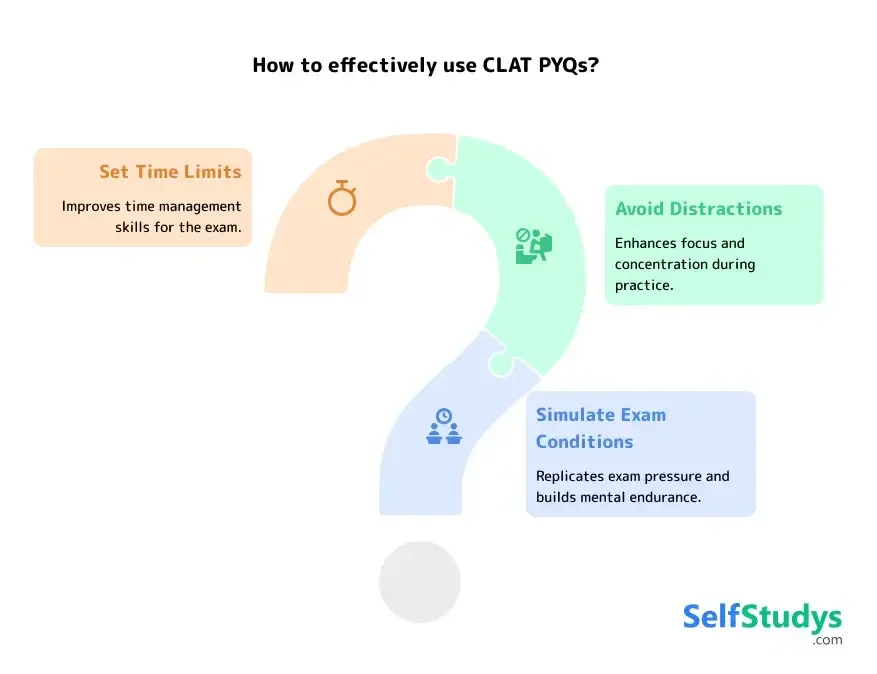
- Firstly, if you want to replicate the pressure of the actual exam, you need to treat every practice session of the previous year CLAT question paper as a real exam. In this, you should set a timer to match the time limits, sit in a quiet place, avoid distractions, do not use any aids like books, calculators, etc. By doing so, you will get real-time practice and develop mental endurance for the exam.
- If you just simply solve the CLAT exam previous year question paper, then it is not enough. It is very important that you review your performance thoroughly. You need to find your weaker areas, understand why the mistakes happened, and mark the questions that you were unsure about. Through this detailed review, you will be able to target your weaker spots, refine your strategy for the exam, as well as avoid similar mistakes in the future.
- The questions in the CLAT exam follow some patterns that are based on specific topics. So, after analyzing a few CLAT previous year question paper PDFs, you should group the questions by subject and then practice these topic-wise groups to gain mastery over each concept. This method is quite effective for Legal Reasoning and Logical Reasoning subjects.
- Tracking your time management and accuracy should be included in the effective use of CLAT previous year question papers with answers PDF download. For this, you can maintain a record of the time that you spend on every section and gradually improve your speed if needed. You should also attempt the CLAT sample paper on SelfStudys for better practice.
Conclusion
In your journey of Common Law Admission Test success, the CLAT previous year question paper is a strategic asset. With this resource, you get a clear view of the exam structure, evolving trends, question types that you may encounter, and so on. Make sure that you do not just solve the past papers but analyze them, learn from them, as well as use them to turn your weaknesses into strengths. You should start including this resource in your daily preparation, track your performance, and get one step closer to getting admitted into one of the top National Law Universities.
In your preparation strategy, solving the CLAT PYQs is very important. With the analysis of past papers, you can get an understanding of the exam pattern, question types, difficulty level, and so on. Their practice also helps you to improve your time management as well as boost your confidence.
It becomes quite easy to understand the pattern of the Common Law Admission Test with the help of the CLAT exam previous year question paper. When you review these papers, you can get familiar with the exam structure like the number of sections that are included, the types of questions that are asked, and the marks distribution that is followed.
It is not mandatory that you solve all the CLAT previous year question papers with answers PDF download. But it is very beneficial to solve as many papers as you can. In this way, you can face a variety of questions and develop a deeper understanding of the exam structure. If you have limited time, then we suggest that you prioritize solving the last 5 to 10 years of PYPs so that you can stay updated with the recent trends.
The ideal timing to start solving the CLAT previous year paper is once you have covered a major part of the prescribed syllabus. In this, you should have completed the important topics in the English Language, Current Affairs with General Knowledge, Legal Reasoning, Logical Reasoning, and Quantitative Techniques subjects.
In order to track your progress, you should maintain a record of every previous year CLAT question paper that you solve. In this, you need to note your total score, the time you took to solve it, as well as the areas where you made mistakes. Then, with time, you should review your scores to check if you are improving or not.







 Profile
Profile Signout
Signout










 Quiz
Quiz
 Get latest Exam Updates
Get latest Exam Updates 










